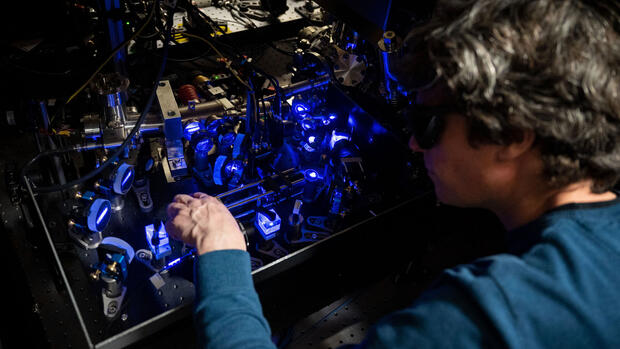Dusseldorf The ambitions that Satya Nadella formulated were, as usual, big: With recent technical advances, “we are closer than ever to a quantum computer that can solve some of the most difficult problems,” said the Microsoft boss at a virtual conference this week. The group now also wants to build such a system. It also offers a new cloud service that customers can use to try out the technology.
However, there is still a long way to go. Microsoft has now published a development plan – known in IT jargon as a roadmap – but so far only a first milestone has been reached. The group did not publish specific goals. It’s more a question of years than decades, said the manager responsible, Krysta Svora, to the technology blog Techcrunch.
From the point of view of experts, Microsoft is making a late start with quantum computers. “The big American technology groups are all jumping on board,” observes Claudia Linnhoff-Popien, who heads the Chair for Mobile and Distributed Systems at the Ludwigs-Maximilians-University (LMU) in Munich. Unlike IBM, Google or IQM, whose computers can already process algorithms, the software manufacturer has created more of a material science basis.
So in the race to develop a supercomputer with the power of quantum mechanics, others are a few miles ahead. Computer scientist Linnhoff-Popien therefore sees Microsoft’s announcement primarily as a “signal to the community and the market”: After corporations such as IBM, Google and Amazon and start-ups such as IQM and Eleqtron, the world’s largest software manufacturer also wants to get involved in development .
IBM promises breakthrough
Computers using the laws of quantum mechanics could one day make calculations that today’s calculators overwhelm. Nadella promised a “new era of scientific discovery” at the presentation.
Experts see particular potential, for example, in the research of materials and molecules, the optimization of complex systems and artificial intelligence. However, the development is complex. Quantum computers use the smallest elementary particles for their calculations – so far it has only been possible to control them to a limited extent.
The companies are working with different approaches to increase the number of computing units, called qubits, while at the same time reducing the susceptibility to errors.
A complex process. After all: IBM recently announced in an article in the science journal “Nature” that it would be able to calculate the inaccuracy of the quantum computer with a new approach. The technology group hopes that its system will soon be able to surpass classic computers in certain tasks for the first time.
Dax group BASF already wants to explore “disruptive power”.
Even if the work is likely to drag on, some companies are already making it possible to develop and test algorithms for quantum computers. This now also includes Microsoft: The cloud service “Azure Quantum Elements” is intended to facilitate materials research with large computing capacities. Customers should also be able to test algorithms for quantum computers as soon as the first systems are available – which is not the case yet.
>> Read here: Wormholes like in science fiction – How quantum computers are changing the world
One of the first customers is BASF. For several years, the chemical company has been using a supercomputer to simulate very complex chemical reactions: for example, how cosmetic substances in body care products interact optimally or which chemical compound is necessary for the perfect removal of dirt from clothing. The digital simulation saves a lot of time for the group.
“Such models require enormous computing power,” says Stephan Schenk, Product Manager for Performance Computing (HPC) at BASF. “The demands on the computers are constantly growing.” A few weeks ago, the Dax group installed a new generation of its “Quriosity” computer, which is 70 percent more powerful than its predecessor. The new cloud service from Microsoft enables BASF to rent additional capacity for peak loads.
The German chemical company is working intensively on quantum computers. “Once the technology has gotten that far, it’s disruptive,” says Schenk. As soon as the systems are available, they want to be one of the first companies to use them. “That’s why we’re very active in this field.”
However, the Dax group assumes that it will be some time before the technology breaks through. “At the moment, quantum computers cannot contribute anything to chemical research because the issues are far too complex for the current prototypes,” says Schenk. “First of all, it’s about bringing the technology to industrial maturity.”
More: How Germany wants to catch up in quantum technology.
